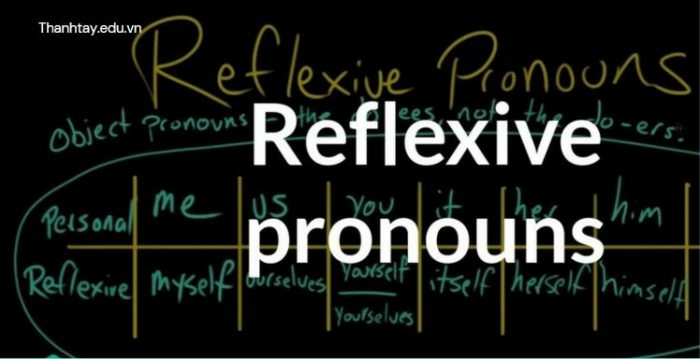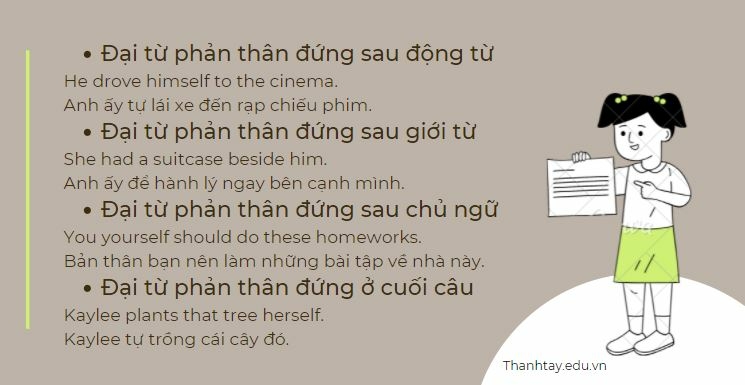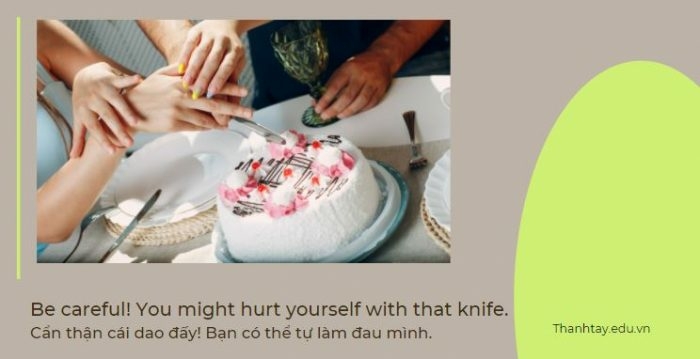Tailieumoi.vn sưu tầm và biên soạn bài tập Thì hiện tại đơn có đáp án, gồm 50 bài tập từ cơ bản đến nâng cao mong muốn giúp các em ôn luyện kiến thức đã được học về Thì hiện tại đơn hiệu quả. Mời các bạn đón xem:
Bài tập Đại từ phản thân trong Tiếng Anh
I. Lý thuyết Đại từ phản thân
1. Đại từ phản thân là gì?
Đại từ phản thân (Reflexive pronouns) là đại từ phản chiếu lại chính chủ từ của câu. Chúng ta đã học các loại đại từ nhân xưng (đứng làm chủ từ và túc từ), đại từ sở hữu và tính từ sở hữu, cách viết đại từ phản thân là kết hợp các loại đó.

Đại từ phản thân là gì?
Ví dụ:
I don’t think I can do it by myself, I really could use some help.
Tôi không nghĩ tôi có thể làm việc đó một mình đâu, tôi thực sự cần sự trợ giúp.
He broke his leg himself.
Anh ấy tự làm chân mình gãy.
Do it yourself, other people seem to be busy as well.
Bạn phải tự làm việc của mình thôi, ai trông cũng đang bận cả.
My little sister can eat herself.
Em gái tôi có thể tự ăn rồi.
2. Các đại từ phản thân trong tiếng Anh
|
Đại từ nhân xưng |
Đại từ phản thân |
|
I |
Myself |
|
You |
Yourself/ Yourselves (số nhiều) |
|
We |
Ourselves |
|
They |
Themselves |
|
He |
Himself |
|
She |
Herself |
|
It |
Itself |
3. Vị trí đại từ phản thân trong câu
Đại từ phản thân (reflexive pronouns) thường có vị trí sau động từ, sau giới từ, sau danh từ làm chủ ngữ và ở cuối câu.

Vị trí đại từ phản thân trong câu
3.1. Đại từ phản thân đứng sau động từ
Ví dụ:
If you don’t love yourself, you cannot accept love from other people.
Nếu bạn không yêu bản thân, bạn không thể tiếp nhận tình cảm từ người khác đâu.
He drove himself to the cinema.
Anh ấy tự lái xe đến rạp chiếu phim.
She bought herself a pizza.
Cô ấy mua cho mình một cái bánh pizza.
3.2. Đại từ phản thân đứng sau giới từ
Ví dụ:
Stop putting pressure on yourselves, you guys look really burned out.
Hãy dừng việc đặt áp lực lên bản thân các bạn đi, các bạn trông thực sự mệt mỏi.
She had a suitcase beside him.
Anh ấy để hành lý ngay bên cạnh mình.
They laugh at themselves while looking in the mirror.
Họ cười chính họ khi nhìn vào gương.
3.3. Đại từ phản thân đứng sau chủ ngữ
Ví dụ:
Even the teachers themselves cannot solve this Maths problem, it is just too hard.
Ngay cả bản thân những giáo viên cũng chẳng thể giải nổi bài toán này, nó thực sự rất khó.
You yourself should do these homeworks.
Bản thân bạn nên làm những bài tập về nhà này.
The man himself fixed the car.
Người đàn ông tự sửa xe của mình.
3.4. Đại từ phản thân đứng ở cuối câu
Ví dụ:
Kaylee plants that tree herself.
Kaylee tự trồng cái cây đó.
This sounds fishy, I’ll investigate this issue myself.
Chuyện này nghe có vẻ mờ ám, tôi sẽ tự mình điều tra vụ này.
The manager spoke to me himself.
Đích thân ông quản lý nói chuyện với tôi.
4. Cách dùng Đại từ phản thân trong tiếng Anh
4.1. Đại từ phản thân làm tân ngữ trong câu
Khi chủ ngữ và tân ngữ cùng chỉ một người hoặc một sự vật, chúng ta có thể dùng đại từ phản thân để thay thế cho tân ngữ phía sau một số động từ.
Cách dùng Đại từ phản thân trong tiếng Anh
Ví dụ:
Mary hurts herself by accident.
Mary vô tình tự làm đau bản thân.
The kids were playing in the backyard and accidentally hurt themselves.
Bọn trẻ đang chơi ở trong vườn thì tự dưng làm mình bị đau.
Be careful! You might hurt yourself with that knife.
Cẩn thận cái dao đấy! Bạn có thể tự làm đau mình.
Một số động từ thường có đại từ phản thân theo sau làm tân ngữ
Cut + đại từ phản thân: đứt tay
Hurt + đại từ phản thân: làm bị thương
Burn + đại từ phản thân: bị bỏng
Kill + đại từ phản thân: tự tử
See/ look at + đại từ phản thân: tự nhìn
Lưu ý: Không sử dụng đại từ phản thân sau các động từ miêu tả những việc mà con người thường làm cho bản thân họ. Ví dụ: wash (giặt giũ), shave (cạo râu), dress (mặc quần áo)…
4.2. Đại từ phản thân dùng làm tân ngữ cho giới từ
Khi chủ ngữ và tân ngữ cùng chỉ một người hoặc một sự vật, đại từ phản thân đứng sau giới từ và làm tân ngữ cho giới từ đó.
Ví dụ:
He told himself to stay calm and collected.
Anh ấy tự nhủ với bản thân rằng phải giữ bình tĩnh và tự chủ.
We were feeling very sorry for ourselves.
Chúng tôi cảm thấy rất tiếc nuối cho chính chúng tôi.
He has to cook dinner for himself.
Anh ấy phải tự nấu ăn cho bản thân mình.
4.3. Đại từ phản thân dùng để nhấn mạnh chủ thể hành động
Khi đại từ phản thân đứng sau chủ ngữ hoặc đứng cuối câu, nó sẽ mang ý nghĩa nhấn mạnh vào danh từ làm chủ ngữ của câu.
Ví dụ:
We will clean the room ourselves.
Chúng tôi sẽ đích thân dọn phòng.
Annie herself cannot understand her husband sometimes.
Kể cả bản thân Annie đôi khi cũng không thể hiểu nổi chồng cô.)
Can you believe what I said now that you saw it yourself?
Bạn đã tin những gì mình nói sau khi tự tai nghe mắt thấy chưa?
Look at the picture! It is so beautiful. Did you draw it yourself?
Nhìn bức tranh đi. Nó thật đẹp. Bạn đã vẽ đich thân vẽ nó sao?
5. Những lưu ý khi sử dụng đại từ phản thân trong tiếng Anh
Lưu ý 1: KHÔNG dùng đại từ phản thân sau các động từ chỉ việc người ta thường tự làm
Ví dụ như các từ: tắm rửa, vệ sinh cá nhân, mặc quần áo, ăn uống, …
I dressed and went to the supermarket. (Tôi mặc quần áo và đi siêu thị.)
I dressed myself and went to the supermarket. – SAI
Trường hợp đặc biệt
Ví dụ:
He could eat himself when he was three.
Anh ấy đã có thể tự ăn khi lên ba.
Can Peter dress himself? He is late for almost 1 hour.
Peter có thể tự mặc quần áo không vậy? Anh ấy muộn gần 1 tiếng rồi.
She tries to dress herself although her leg is broken.
Cô ấy cố gắng để tự mặc quần áo mặc dù chân cô ấy bị gãy.
Lưu ý 2: KHÔNG sử dụng đại từ phản thân sau giới từ chỉ vị trí và sau ‘with’ khi mang nghĩa ‘cùng đồng hành, sát cánh’.
Ví dụ:
I had some friends with me. (Tôi có một vài bạn đồng hành với tôi.)
I had some friends with myself. – SAI
6. Một số phrasal verb liên quan đến đại từ phản thân
Enjoy yourself: Hãy tận hưởng
Behave yourself: Hãy cư xử đúng mực
Help yourself: Tự cứu lấy bản thân mình
Make yourself at home: Hãy tự nhiên như ở nhà
Live by oneself: Sống một mình
See oneself out: Rời khỏi nơi mình vừa tới
See oneself as: Tưởng tượng mình như là
Content oneself with something: Tự hài lòng với cái gì
Treat oneself to something: Tự thưởng thức, chiêu đãi
Pride oneself on something: Tự đánh giá cao bản thân về cái gì
II. Bài tập Đại từ phản thân trong Tiếng Anh
Bài 1: Điền đại từ phản thân thích hợp vào chỗ trống.
Peter made this dish ____________________.
My mother is learning to use a mobile phone _______________.
He cut ______________ while cooking dinner.
Did you do the homework _______________?
His computer usually crashes and turns off by ______________.
You should teach your children to behave ________________.
They are so selfish. They only think about ________________.
I could dress ____________ when I was 5.
She went to the party by seeing _____________ out a few minutes later.
We pride _____________ on playing football.
He burnt ____________with the matches.
They are taking a lot of photos of _______________.
Look! The radio has turned on by _______________.
Can you look for the shoes ______________? I am cooking in the kitchen.
Hello, are you the person that my mom recommended ______________
Đáp án:
himself
herself
himself
yourself
itself
themselves
themselves
myself
herself
ourselves
himself
Themselves
itself
yourself?
herself
Bài 2: Viết lại các câu dưới đây sử dụng đại từ phản thân trong tiếng Anh.
Jane offered her help but I declined. Now I have to do all of the project alone.
It was him who allowed me to join this meeting.
I don’t want to do things on my own. Teamwork is better.
My son ran into a sharp piece of metal and was cut by it.
This was ordered by your boss, she insists on meeting your team.
Đáp án:
Jane offered her help but I declined. Now I have to do all of the project by myself. Jane đề nghị giúp đỡ nhưng tôi đã từ chối. Bây giờ tôi phải làm toàn bộ dự án một mình.
He himself allowed me to join this meeting. Chính anh ấy đã cho phép tôi tham gia cuộc họp.
I don’t want to do things by myself. Teamwork is better to me. Tôi không muốn làm việc một mình không ai giúp. Theo tôi, làm việc theo nhóm tốt hơn.
My son ran into a sharp piece of metal and accidentally cut himself. Con trai tôi dẫm lên một mảnh kim loại sắc và vô tính bị thương.
Your boss insists on meeting your team herself. Sếp của bạn kiên quyết phải đích thân gặp đội của bạn.
III. Bài tập vận dụng Đại từ phản thân trong Tiếng Anh
I. Choose the correct reflexive pronouns:
myself - yourself - himself - herself - itself - ourselves - yourselves - themselves
Alan made this dish_____________________.
Laura sent the email_____________________.
We shall not quarrel easily among_____________________, and forget our common objective.
Sara, did you write this poem_____________________?
Yes, I called her_____________________.
He cut_____________________with the knife while he was sharpening it.
My computer often crashes and turns off by_____________________.
She often talks to_____________________when she is upset
John and Alan, I am not going to do the homework for you. You have to do it_____________________.
The students were so noisy. Even Nancy and Leila were making a lot of noise_____________________.
Did the children behave_____________________?
I caught sight of_____________________in the mirror.
Don't worry! He can do it_____________________.
Don't be so selfish! You think only about_____________________.
Please, John, make_____________________feel at home.
She hurt_____________________while doing the housework.
I told him about the sad news_____________________.
Good news! The horse came back home by itself by_____________________.
Did the two of you do this job by_____________________?
Do we live for_____________________or for our loved ones?
The children can look after_____________________.
Leila, please, help_____________________to the cookies!
Đáp án:
Alan made this dish himself.
Laura sent the email herself .
We shall not quarrel easily among ourselves, and forget our common objective
Sara, did you write this poem yourself ?
I called her myself .
He cut himself with the knife while he was sharpening it.
My computer often crashes and turns off by itself .
She often talks to herself when she is upset.
John and Alan, I am not going to do the homework for you. You have to do it yourselves .
The students were so noisy. Even Nancy and Leila were making a lot of noise themselves .
Did the children behave themselves ?
I caught sight of myself in the mirror.
Don't worry! He can do it himselfTrue .
Don't be so selfish! You think only about yourselfTrue.
Please, John, make yourselfTrue feel at home.
She hurt herselfTrue while doing the housework.
I told him about the sad news myselfTrue.
Good news! The horse came back home by itselfTrue.
Did the two of you do this job by yourselvesTrue?
Do we live for ourselvesTrue or for our loved ones?
The children can look after themselvesTrue.
Leila, please, help yourselfTrue to the cookies!
II. Choose the correct reflexive pronouns from the dropdown menu.
myself, yourself, himself, herself, itself, ourselves, yourselves, themselves
Robert made this T-shirt _____________.
Lisa did the homework __________________.
We helped_____________________to some cola at the party.
Emma, did you take the photo by ______________?
I wrote this poem _________________.
He cut_____________________with the knife while he was doing the dishes.
The lion can defend ________________.
My mother often talks to ____________.
Tim and Gerry, if you want more milk, help _____________.
Alice and Doris collected the stickers ______________.
I did not want to believe it and then I saw the UFO _________________.
The girl looked at_____________________in the mirror.
Freddy, you'll have to do your homework_____________________.
You don't need to help them. They can do it_____________________.
I introduced_____________________to my new neighbour.
Boys, can you make your beds_____________________?
She made_____________________a pullover.
What happens when a fighting fish sees_____________________in the mirror?
The father decided to repair the car_____________________.
We can move the table_____________________.
Đáp án:
Robert made this T-shirt himself.
Lisa did the homework herself
We helped ourselves to some cola at the party.
Emma, did you take the photo by yourself?
I wrote this poem myself.
He cut himself with the knife while he was doing the dishes.
The lion can defend itself.
My mother often talks to herself.
Tim and Gerry, if you want more milk, help yourselves.
Alice and Doris collected the stickers themselves.
I did not want to believe it and then I saw the UFO myself.
The girl looked at herself in the mirror.
Freddy, you'll have to do your homework yourself.
You don't need to help them. They can do it themselves.
I introduced myself to my new neighbour.
Boys, can you make your beds yourselves?
She made herself a pullover.
What happens when a fighting fish sees itself in the mirror?
The father decided to repair the car himself.
We can move the table ourselves.
III. Fill in these sentences with MYSELF, YOURSELF, HERSELF, HIMSELF, ITSELF, OURSELVES, YOURSELVES or THEMSELVES.
1. Every morning I wash_____________________and clean my teeth.
2. Jane is a baby, she is too small to eat by_____________________.
3. Peter is very lazy. He always copies his friend´s homework and never does it by_____________________.
4. The children can decorate the Christmas tree by_____________________.
5. Julie is always looking at_____________________in the mirror.
6. If you can't do this exercise by_____________________, ask the teacher for help.
7. The cat cleans_____________________with its tongue.
8. Don´t help us, Dad! I and Jim can paint the car all by_____________________.
9. You are five years old, Danny. You have to comb your hair by _____________________now.
10. Hi, Martin! Hi, Rebeca! Please, come in and make_____________________at home.
Đáp án:
1. Every morning I wash myself and clean my teeth.
2. Jane is a baby, she is too small to eat by herself.
3. Peter is very lazy. He always copies his friend´s homework and never does it by himself.
4. The children can decorate the Christmas tree by themselves.
5. Julie is always looking at herself in the mirror.
6. If you can't do this exercise by yourself, ask the teacher for help.
7. The cat cleans itself with its tongue.
8. Don´t help us, Dad! I and Jim can paint the car all by ourselves.
9. You are five years old, Danny. You have to comb your hair by yourself now.
10. Hi, Martin! Hi, Rebeca! Please, come in and make yourselves at home.
IV. Choose the correct reflexive pronouns from the dropdown menu.
myself, yourself, himself, herself, itself, ourselves, yourselves, themselves
1. The cat nearly killed_____________________when it ran across the road.
2. I enjoyed_____________________at the party.
3. He always looks at_____________________in the mirror.
4. We helped_____________________to the coffee.
5. The woman accidentally hurt_____________________with the knife.
6. The children enjoyed_____________________at the beach.
7. The two of you shouldn't do that. You'll hurt_____________________.
8. He paid for_____________________.
9. Some people only think about_____________________.
10. She didn't tell him. I told him_____________________.
Đáp án:
1. itself
2. myself
3. himself
4. ourselves
5. herself
6. themselves
7. yourselves
8. himself
9. themselves
10. myself
V. Choose the correct answer
1. Linda is very van. She often looks at ………….. in the mirror.
A. himself
B. itself
C. herself
2. Thomas talked quietly to ……….
A. himself
B. itself
C. themselves
3. The book isn’t too good. I’m sure he wrote it ……….
A. itself
B. herself
C. himself
4. They are too young. They can’t feed ………..
A. himself
B. themselves
C. yourself
5. The cat washed ……….. in the pool
A. himself
B. itself
C. yourself
Đáp án:
|
1. C |
2. A |
3. C |
4. B |
5. B |